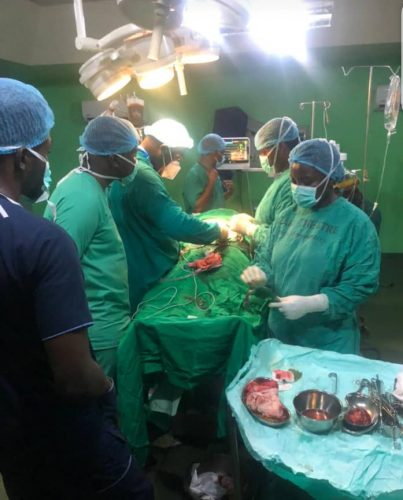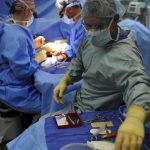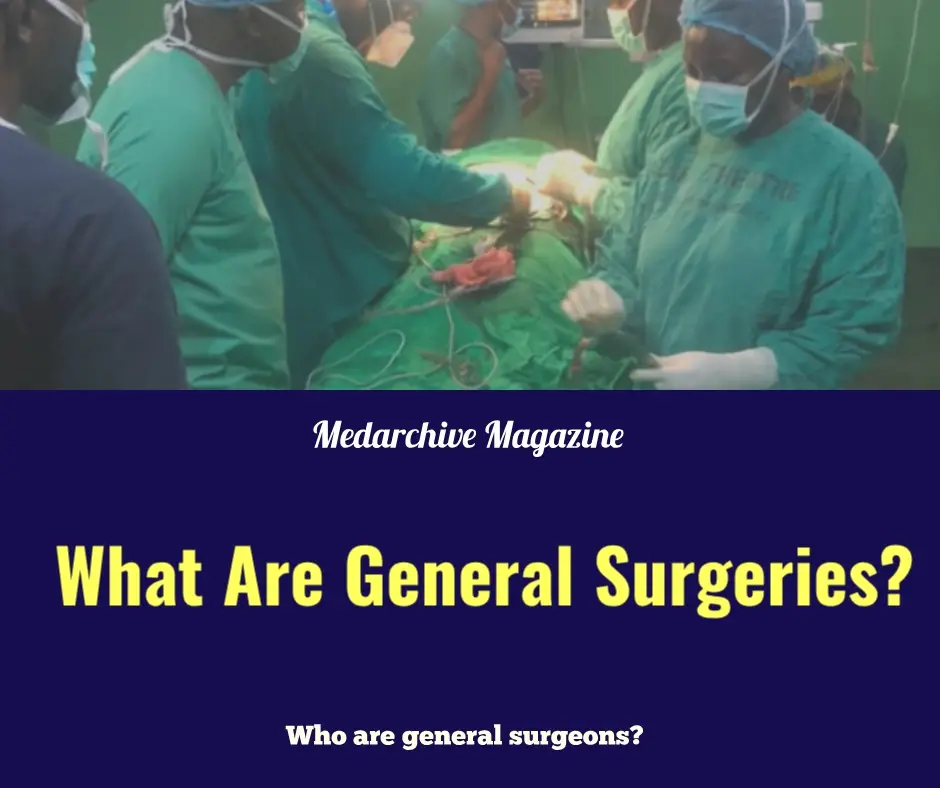Contrary to the opinions held by a good number of persons, general surgeries are not all surgeries and general surgeons are not doctors who can perform all the surgeries albeit with the vast training and knowledge they acquire.
In this post, we will be answering the following questions to help you understand the roles of general surgeons in healthcare and the kind of surgeries they are trained to perform;
Who is a general surgeon?
How to become a general surgeon
What are the general surgery specialties?
What are general surgeries?
What are the instruments for general surgery?
General surgery job description
So we will pick all the questions and subtitles one by one and discuss them.
But before then a surgeon or a surgical specialist is someone who has graduated from medical school and has finished his residency and fellowship programs in any of the specialties in surgery.
Surgeons use varieties of tools called surgical equipment to diagnose and treat illnesses, unlike medical specialists who depend mainly on medications and their clinical acumen to diagnose and treat diseases.
Table of Contents
- Who Is A General Surgeon?
- What are general surgeries?
- General surgery job description
- Final Words!

Who Is A General Surgeon?

A general surgeon is a surgical specialist who is trained to diagnose and treat illnesses affecting mainly the abdomen and its contents, and certain parts of other body tissues and organs like the breasts and thyroid glands.
So the term general surgeon does not necessarily mean that they can perform any surgery related to all parts of the body.
Other surgical specialists specialize in diseases affecting the other parts of the body like the brain and nervous system for Neurosurgeons, the bones and surrounding structures for Orthopedic surgeons, the ear, nose, and throat for Ortolaryngologists and so on.
How To Become A General Surgeon
Just like any other surgical specialty, becoming a general surgeon requires long years of hard work and intensive training. This training is all-encompassing and not just limited to sound medical education in an accredited medical school but also character development and discipline.
Steps In Becoming A General Surgeon
Step 1: The first step in becoming a general surgeon is to bag the Bachelor in Medicine and Bachelor in Surgery degree also called Doctor of Medicine and Surgery. This takes 5 to 6 years of training or more in a medical school including clinical rotations.
Step 2: Medical internship; which is a one-year training that medical graduates undergo to get a full license to be called a doctor.
In the United Kingdom, doctors also undergo an additional two to three years of the foundational program as a pre-requisite for being accepted into a specialist or residency program.
Step 3: The next step is the residency program which is the final step before a doctor can be called a specialist or a consultant general surgeon. After this training, you receive your full license to practice as a general surgeon in any country where your certifications are honored. Residency training for general surgery takes a minimum of 4 years to complete.
So in all, it takes at least 12 years of training to become a general surgeon.
Special Requirements To Become A General Surgeon
General surgeons are well known for the following;
- A Good Knowledge Of Anatomy
Don’t get it wrong, all surgeons should have a sound knowledge of anatomy and general surgeons are not exempted.
Trusted studies have linked the correlation between medical students who performed above average in anatomy during their medical school days and their area of specialization. And it was found that these students mostly ended up as surgeons, especially in general surgery.
- Endurance
The ability to sand for long hours during surgeries is a virtue every general surgeon should have. Although on average, general surgeries do not take so much time as other surgeries you still need the endurance to perform them.
- Altruism
General surgeons are also selfless people. The fact that they give in years of their life to studies and the care of patients backs up this fact.
- Courage
Some people do not like the sight of blood or cutting up of someone’s tummy. It takes lots of courageous effort to do this and this courage does not lack among general surgeons.
- Precision
Surgeries as a whole require some level of precision and excellent coordination of the mind and hands. The ability to perform surgeries with minimal errors is what distinguishes a good surgeon from others.
- Creativity
Improvisation is a vital concept in surgeries. It involves the ability to make-shift in the absence of the ideal tools need for a specific procedure by using a similar tool to achieve the same or similar result.
- Mindfulness
It is unheard of that a general surgeon while carrying out a general surgery doses off during a procedure. Mindfulness is an essential quality every surgeon must possess to minimize the risk of complications during surgeries.
- Excellent Communication Skills
As a general surgeon, you bear certain responsibilities that require excellent communication skills like counseling patients for any procedure, obtaining informed consent, teaching medical students, and breaking bad news.
What Are The General Surgery Specialties?
With the advancement in patient care, the discovery of new diseases, and increasing rate of general surgeons being trained, the general surgery specialty has been further divided into subspecialties in healthcare facilities with adequate manpower in order to reduce burnout among general surgeons and as well increase the quality of patient care.
As a general surgeon, you can go further to major in any of the general surgery subspecialties which include;
- Trauma surgery/Critical Care Surgery
- Laparoscopy Surgery
- Colorectal Surgery
- Breast Surgery
- Vascular Surgery
- Endocrine Surgery
- Transplant surgery
- Surgical oncology
- Cardiothoracic Surgery
- Pediatric Surgery
Trauma Care Surgery/Surgical Critical Care
In some places like the United States, it is the duty of general surgeons to carry out trauma care.
General surgeons who want to major in the trauma care subspecialty obtain advanced training in this field.
Trauma care involves giving first aid, resuscitation, and initial treatment to patients who are victims of accidents and some general surgical emergencies.
Laparoscopic Surgery
Laparoscopy is a minimal access procedure where cameras and small instruments are inserted into tiny openings made in the abdomen with the aim of administering treatment or making a diagnosis.
The aim of minimal access surgeries varies from cosmesis to efficiency but is not limited to these.
General surgeons who want to specialize in this area receive special training in minimal access techniques.
Colorectal Surgery
Colorectal general surgeons receive further specialized training to diagnose and treat diseases affecting the large intestines, the rectum, and the anus.
Breast Surgery
General surgeons under this subspecialty are trained to diagnose and treat all forms of diseases affecting the breast.
Vascular Surgery
Even though in recent times and in some centers, vascular surgery has its own separate residency program, general surgeons can also stand in for vascular surgeons after they must have received special training for this.
Endocrine Surgery
Common endocrine disorders that general surgeons in this subspecialty are trained to treat include disorders affecting the thyroid, parathyroid, and thymus glands located in the neck and adrenal glands located above the kidneys.
Transplant surgery
Transplant surgery is a general surgery subspecialty that is responsible for all the procedures that surround organ transplants. Examples of such organs that can be transplanted include; liver, heart, kidney, pancreas, and small intestines.
Surgical oncology
A general surgical oncologist is specially trained to treat patients with cancers but not all cancers. Cancers affecting the brain, organs in the chest, gynecologic cancers, and so on are handled by a different set of surgical specialists trained in that field like neurosurgeons, cardiothoracic surgeons, gynecological oncologists, and so on.
Cardiothoracic Surgery
In most places in the world, cardiothoracic surgery is a separate surgery specialty requiring a special program of its own. But in the United States, most cardiothoracic surgeons complete a residency in general surgery first which lasts 5-7 years, then go on to complete extra 2-3 years of training in cardiothoracic surgery.
Pediatric Surgery
In some places, pediatric surgery is a subspecialty of general surgery but only for patients younger than 18 years of age. While in some other places, pediatric surgery is a separate residency program.
Also, Read; What Is Physiological Psychology? Definition, Career and Salary
What are general surgeries?

Now you know who general surgeons are, and the subspecialties under general surgery, so the next thing is to answer the question; what are general surgeries?
General surgeries are those surgeries performed to diagnose and treat diseases affecting the following organs;
- Oesophagus
- Stomach
- Small intestine
- Large intestine
- Rectum
- Pancreas
- Liver
- Gall bladder
- Appendix and
- Bile ducts.
One thing that all the above list organs have in common is that they are located in the abdomen; the region for which general surgeons are well known. But apart from the above, other examples of organs which that general surgeons handle include the thyroid gland, parathyroid glands, the breasts, thymus, adrenal glands, and the skin.
Also, Read; Medical School Headshots: Is Taking A professional Headshot Worth It?
Examples of General Surgeries
The following surgeries can be performed by a general surgeon;
Gastroesophageal Reflux Correction: gastroesophageal reflux disease is a chronic condition that is characterized by the upcoming of the stomach acid from the stomach to the esophagus.
It causes symptoms like burning chest pain (heartburn), loss of appetite, and weight loss. In conditions where medications alone cannot treat this, a surgical procedure called Nissen fundoplication is helpful.
Hernia Repair: When one of your internal organs bulges out of the wall where it is contained, it is called a hernia. Common places where this condition can occur are usually located within the abdomen like the abdomen, groin, waist, diaphragm, brain, and a site of the previous operation.
But general surgeons are only involved if the hernia is located in the abdomen, diaphragm, waist regions, and groins. Surgeries that can be performed to correct hernias include; herniorrhaphy, hernioplasty, and herniotomy.
Stomach surgery: Most surgeries performed in the stomach are performed by general surgeons. These surgeries include but are not limited to surgeries for stomach cancers, perforations, and trauma to the stomach wall.
Breast lump and cancer surgeries: This includes different forms of surgeries on the breast like lump removal and breast cancer resection. But other special surgeries like breast augmentation are performed by plastic surgeons.
Intestinal Surgery: General surgeons also perform all kinds of surgery involving the intestines like tumor excision and intestinal reconstructions.
Fistula Repair: A fistula is simply an abnormal connection between two epithelial surfaces like the intestines, blood vessels, bladder, rectum, and the rest. General surgeons can repair fistulas affecting most of the listed organs except the blood vessels which are repaired by vascular surgeons.
Endoscopic procedures like gastroscopy and colonoscopy: In certain occasions where a gastroenterologist is not available, a general surgeon can stand in for them and perform a gastroscopy or a colonoscopy.
The two procedures involve using an instrument with a camera attached to visualize the stomach and the rectum respectively with the aim of making a diagnosis or administering treatment.
Accidents and Trauma Surgeries: This type of general surgery is handled by general surgeons under trauma and critical care unit. It involves care for different kinds of accident victims like burns, and road traffic accident victims.
Treatment Of Peripheral artery disease: General surgeons who received special training in vascular surgery can be helpful in the treatment of diseases affecting the peripheral arteries of the arms and legs.
Appendicectomy: This is a very common surgery which general surgeons are known for. It involves the removal of the appendix in people that it is causing issues.
Cricothyroidotomy: This surgery involves a cut made on the skin in the front of the neck to access the trachea especially in emergency situations where an open respiratory airway is needed to resuscitate a patient.
This is usually in patients with airway obstruction due to any or more of the following; foreign body, facial trauma, angioedema.
This procedure is resorted to when an orotracheal or nasotracheal intubation has failed, is impossible, or is contraindicated.
Other surgeries that general surgeons can perform include;
- Fasciotomies
- Emergency laparotomy
- Stanch bleeding
- Cholecystectomy
- Colorectal surgery, etc.
What are the instruments for general surgery?
Instruments used for surgeries vary and are dynamic especially with newer advances in technology.
But there are very common instruments that are commonly used today for general surgical procedures, and they are classified as follows;
Dissecting and Cutting Instruments
They are used for cutting through body tissues. These include but are not limited to the following;
- Scalpels, saws, and scissors
- Elevators used for both cutting and retraction
- Diarthermy and cautery
Grasping and Holding Instruments
They are used for holding tissues in place while cutting and they include;
- Forceps and clamps
Hemostatic instruments
Used to minimize blood loss during surgeries and they include;
- Artery forceps
- Sutures
- Cautery and like instruments
Retractors
They are used commonly to expose tissues for easy visualization. There are a good number of retractors that can be used to achieve this.
Tissue Unifiers
They are used to appose two tissues. Common instruments in this category are the needles and the needle holders.
Also, Read; Radiologist Vs Sonographer: Career, Job, And Salary
General surgery job description
Apart from performing surgeries, general surgeons have a whole lot of other responsibilities which include;
- Taking patient’s history, physical examination and making the diagnosis of diseases
- Reviewing patient’s medical history and determining the best surgical procedure for treatment
- Counseling patients on the risk and benefits of surgical procedures they are about to undergo
- Administering preoperative, intraoperative, and postoperative care to patients
- Ensuring order and leading the who surgery team
- Coordinating activities of other hospital staff
- Joining campaigns to execute plans for disease prevention and health promotion
- Carrying out research to develop and test new surgical techniques
General Surgeon Salary
Recent data from salary.com reveals that the median salary for a general surgeon is $374,310 per annum. The least 10 percent are paid an average of $264,228 per annum and the highest 10 percent are paid an average of $444,728 per annum.
Also, Read; 15+ Ultimate Gift Ideas FOr Doctors And Young Medical Graduates
Final Words!
General surgeons play vital roles in patient care. Also, contrary to the misinformed notions that general surgeons are trained to perform virtually all the surgeries, they are only trained to perform some specific surgeries involving mostly the thyroid, parathyroid, thymus glands, the breasts, and the abdomen with its contents.
We have succeeded in answering the questions; Who are general surgeons and what are general surgeries.
You can join the campaign to correct the misconception about general surgeries and general surgeons by sharing this.
Other Posts You May Like



